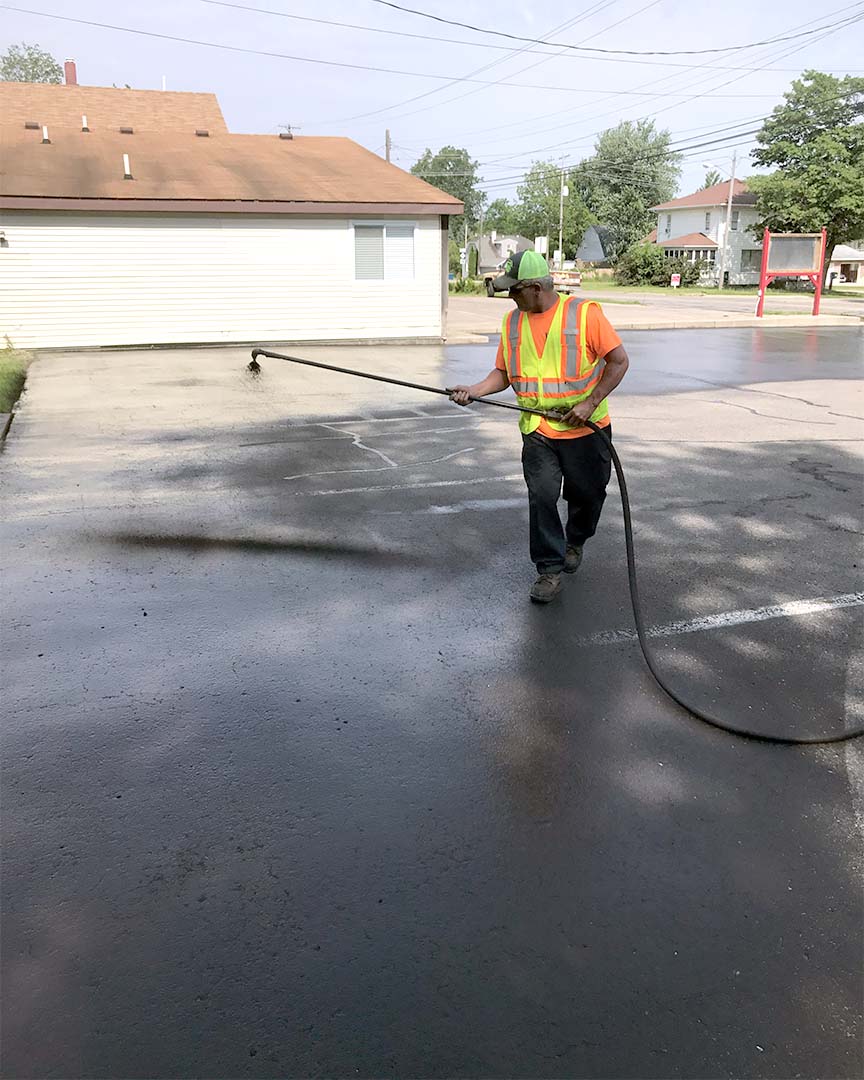Safeguard Surface Areas with Expert Asphalt Sealing: Cold Mix Basics
Safeguard Surface Areas with Expert Asphalt Sealing: Cold Mix Basics
Blog Article
Cold Mix Asphalt Vs. Hot Mix Asphalt: Which Is Right for You?

Composition Differences
Cold mix and warm mix asphalts differ significantly in their structure, with unique features that influence their efficiency and applications. Cold mix asphalt is created by emulsifying the asphalt binder with water and an emulsifying agent prior to blending it with aggregate. This technique enables for the asphalt to be workable at lower temperatures, making it suitable for temporary repair services and for usage in cooler weather conditions. Warm mix asphalt, on the various other hand, is produced at heats, generally in between 300-350 ° F, which helps to attain better compaction and a much more sturdy end product. The warm mix asphalt production process includes warming the aggregate and asphalt binder separately before integrating them at the asphalt plant.
Moreover, cold mix asphalt tends to be less dense and much more adaptable than hot mix asphalt. This versatility makes it better suited for locations with greater levels of activity, such as driveways or roadways with rush hour. On the other hand, hot mix asphalt is understood for its high toughness and resistance to rutting and breaking, making it a preferred option for highways and high-traffic roadways where longevity is essential.
Installment Process Variations
The procedure of installing cold mix and hot mix asphalt exhibits significant differences in their procedures and needs. In comparison, hot mix asphalt necessitates an extra sophisticated installment procedure. Due to the home heating demands, warm mix asphalt setups are generally lugged out by professionals with specialized devices, making certain a more structurally audio and permanent result.
Longevity and Longevity Elements
When thinking about asphalt options, toughness and longevity are essential factors to examine for enduring sidewalk efficiency. Hot mix asphalt (HMA) is known for its phenomenal longevity and long life.
In terms of long life, HMA usually outshines CMA due to its premium strength and resistance residential or commercial properties. HMA pavements have a longer solution life, requiring much less regular repair services and upkeep, which can translate to set you back savings in the future. Furthermore, HMA pavements are extra quickly customizable to satisfy details task requirements, better enhancing their durability.
Price Factors To Consider
Taking into consideration the her latest blog monetary implications is a crucial aspect when assessing the option in between hot mix asphalt (HMA) and cool mix asphalt (CMA) for sidewalk tasks. While the first expense of hot mix asphalt is commonly greater than that of chilly mix asphalt, HMA usually offers a much more cost-efficient option in the future because of its superior longevity and long life. HMA is understood for its capacity to endure rush hour loads and harsh climate problems, reducing the demand for regular repair services and maintenance. On the other hand, cool mix asphalt is much more inexpensive in advance however might require even more regular patching and resurfacing, leading to higher upkeep costs with time.
In enhancement to material costs, it's necessary to consider the expenses associated with installation and upkeep when comparing HMA and CMA. HMA typically requires customized tools and knowledgeable labor for appropriate installation, which can influence total task expenses. On the other hand, CMA is easier to deal with and can often be used making use of simpler strategies, possibly decreasing installment expenses. Inevitably, the decision between HMA and CMA ought to take into consideration not just the initial expense yet likewise the long-term monetary implications to establish the most affordable alternative for the particular sidewalk project.
Environmental Influence Contrast
Contrast of the ecological impacts in between warm mix asphalt (HMA) and chilly mix asphalt (CMA) discloses distinct distinctions in sustainability techniques. HMA manufacturing needs heats, resulting in boosted power usage and greenhouse gas emissions. The process likewise releases unstable natural compounds (VOCs) and harmful air toxins (HAPs) into the environment. In comparison, CMA is produced and applied at reduced temperature levels, minimizing power use and emissions considerably. The reduced blog manufacturing temperatures of CMA result in decreased fuel intake and lower levels of CO2 emissions, making it a much more eco-friendly option.
Additionally, using CMA usually involves recycling existing asphalt pavement, promoting source preservation and decreasing the amount of waste sent to garbage dumps. This recycling aspect even more improves the sustainability of CMA contrasted to HMA. In general, when taking into consideration the environmental impact, CMA emerges as an extra eco sustainable choice as a result of its lower energy needs, minimized exhausts, and the capacity for recycling existing products. By selecting CMA over HMA, roadway construction tasks can contribute positively to environmental preservation initiatives.
Verdict
In conclusion, the choice between chilly mix asphalt (CMA) and hot mix asphalt (HMA) depends upon numerous elements such as make-up, installation procedure, resilience, durability, cost, and environmental influence. angle parking. While CMA uses a fast and affordable service for minor fixings, HMA makes certain exceptional toughness and long life for rush hour locations. Think about these aspects meticulously to determine which sort of asphalt is the right option for your paving requires

Thinking about the financial effects is a vital aspect when reviewing the choice between warm mix asphalt (HMA) and chilly mix asphalt (CMA) for sidewalk projects. While the preliminary price of hot mix asphalt is generally higher than that of cold mix asphalt, HMA commonly provides a much more cost-efficient service in the long run due to its superior durability and longevity. asphalt patch repair.Contrast of the ecological impacts between warm mix asphalt (HMA) and these details cool mix asphalt (CMA) discloses distinct differences in sustainability methods.In conclusion, the option in between chilly mix asphalt (CMA) and warm mix asphalt (HMA) depends on numerous variables such as structure, installment procedure, durability, longevity, cost, and environmental effect
Report this page